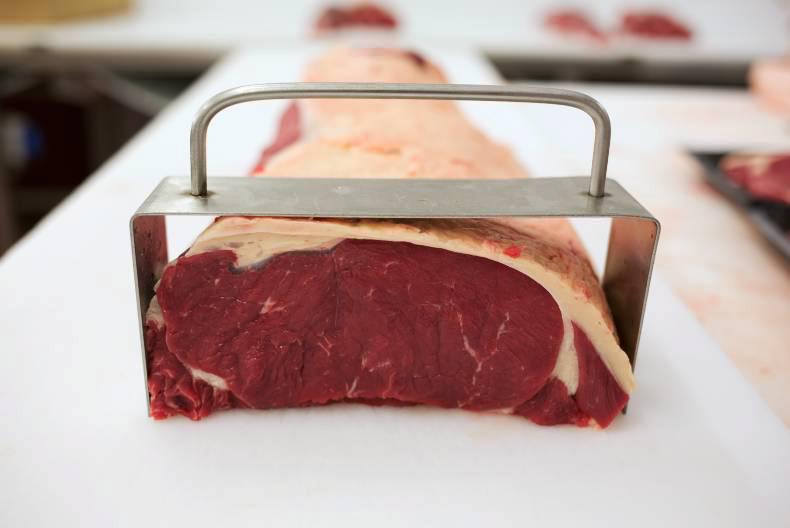The Scottish Association of Meat Wholesalers (SAMW) held a Brexit-focused conference in Glasgow this weekend. In his president’s address, Frank Clarke warned against agriculture being traded away in negotiations. “The scramble to secure free-trade deals with non-EU nations must not be allowed to damage our home market,” he said.
UK farming minister George Eustice was called out for talking about raising animal welfare standards further as a protective measure against imports. The strong view of Scotland’s meat industry is that the standards are high enough and any further raising of standards would increase costs, but not add any further value.
Migrant labour
Numbers of people and cattle were raised as an issue. The dependence of the Scottish meat processing industry on EU migrant labour is no different from any other UK region, and the conference emphasised the need for continued access to this, along with a programme to generate better indigenous UK participation in the sector.
A further concern was the fact that Scotland’s cattle numbers are now at their lowest since 1950. The vicious circle of falling numbers leading to reduced factory throughput and consequent increased processing costs was highlighted as a real problem for the future Scottish beef industry.
On the issue of cattle, weights at slaughter continue to be a particular problem for Scotland, according to Clarke. Scotland’s steer average carcase weight is now 390kg, the highest of any region of the UK. This was emphasised by meat plant operator Alan McNaughton, who runs the McIntosh Donald plant in northern Scotland in our podcast below:
Listen to “Scottish meat processor Alan McNaughton” on Spreaker.
An open discussion forum focused on making sure the industry asked for the proper level of support for a UK agriculture policy post-Brexit. Conall Donnelly from NIMEA, the Northern Ireland meat processors representative organisation, said there was a danger that expectations were allowed to be lowered more than necessary. Indications that limits on government support were curtailed by WTO rules was also challenged, with some arguing that the WTO actually allows more support flexibility than is currently used by the EU.
Listen to Conall Donnelly in our podcast below:
Listen to “Conall Donnelly of NI Meat Exporters Association” on Spreaker.
Read more
Full coverage: Brexit
The Scottish Association of Meat Wholesalers (SAMW) held a Brexit-focused conference in Glasgow this weekend. In his president’s address, Frank Clarke warned against agriculture being traded away in negotiations. “The scramble to secure free-trade deals with non-EU nations must not be allowed to damage our home market,” he said.
UK farming minister George Eustice was called out for talking about raising animal welfare standards further as a protective measure against imports. The strong view of Scotland’s meat industry is that the standards are high enough and any further raising of standards would increase costs, but not add any further value.
Migrant labour
Numbers of people and cattle were raised as an issue. The dependence of the Scottish meat processing industry on EU migrant labour is no different from any other UK region, and the conference emphasised the need for continued access to this, along with a programme to generate better indigenous UK participation in the sector.
A further concern was the fact that Scotland’s cattle numbers are now at their lowest since 1950. The vicious circle of falling numbers leading to reduced factory throughput and consequent increased processing costs was highlighted as a real problem for the future Scottish beef industry.
On the issue of cattle, weights at slaughter continue to be a particular problem for Scotland, according to Clarke. Scotland’s steer average carcase weight is now 390kg, the highest of any region of the UK. This was emphasised by meat plant operator Alan McNaughton, who runs the McIntosh Donald plant in northern Scotland in our podcast below:
Listen to “Scottish meat processor Alan McNaughton” on Spreaker.
An open discussion forum focused on making sure the industry asked for the proper level of support for a UK agriculture policy post-Brexit. Conall Donnelly from NIMEA, the Northern Ireland meat processors representative organisation, said there was a danger that expectations were allowed to be lowered more than necessary. Indications that limits on government support were curtailed by WTO rules was also challenged, with some arguing that the WTO actually allows more support flexibility than is currently used by the EU.
Listen to Conall Donnelly in our podcast below:
Listen to “Conall Donnelly of NI Meat Exporters Association” on Spreaker.
Read more
Full coverage: Brexit






 This is a subscriber-only article
This is a subscriber-only article











SHARING OPTIONS: